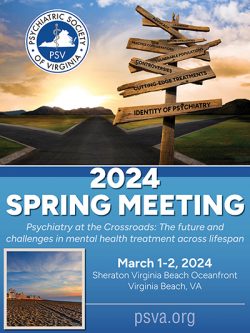By Catherine Casey, MD
Associate Professor in Family Medicine
UVA Health System
Charlottesville, VA
Caring for gender-diverse patients is often, by necessity, a multispecialty endeavor. Collaborations between psychiatrists, endocrinologists, and surgeons were documented over 100 years ago at Dr. Magnus Hirschfeld’s Institute for Sex Research. At the University of Virginia, similar collaborations existed in the 1980s led by Dr. Milton Edgerton. Today, UVA’s Gender Health Program, a collaboration of 40 physicians and therapists, allows gender-diverse patients easier, more streamlined access to care. Innovations which have sprung from this partnership include a dedicated transgender psychiatry clinic run by residents, routine PHQ-3 screening of gender diverse patients by nurses, and behavioral health specialists available on-site.
Psychiatrists play a critical role in this program, not only by treating mental health issues, but also by writing letters, which enable patients to access gender affirmation surgery. A 2015 survey of 27,715 transgender patients found that gender affirmation surgery resulted in a 42% reduction in psychological distress, a 44% reduction in suicidal ideation, and a 35% reduction in smoking (Almazan 2021). The reduction in suicidal ideation is especially compelling given the 41% suicide attempt rate among transgender adults.
Reasons NOT to write a letter for gender-affirming surgery include if the patient is actively psychotic, lacks decision-making capacity, or does not have gender dysphoria. Uncommon conditions for which a patient not meeting criteria for gender dysphoria may seek treatment include fetishes or cultural bans on same-sex relationships. The rate of regret for gender-affirming surgery is less than 1%, which compares favorably to LASIK surgery (4-5%) and surgeries as a whole (>14%) (Bustos et al 2021). Of the <1% who regret surgery, it is most often an issue of cosmesis and not a desire to re-transition.
The Transgender Health Alliance of Central Virginia (THACVA), operated by the Virginia Department of Health, is a listserv of medical and mental health professionals who care for gender-diverse patients. It is easy to join by going to thacva.org. THACVA members often collaborate by asking whether there is a mental health provider in a certain region of Virginia who accepts new patients and specific insurances. It is an amazing resource for getting your patients in touch with therapists who can meet their specific needs (such as gender diversity plus neurodiversity, specialty in certain age ranges, couples counseling, or experience with certain issues). Many THACVA providers are adept at writing letters for patients and can either write letters or help answer questions about letter-writing.




